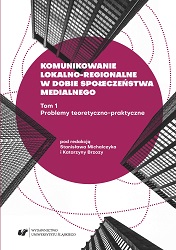Lokalnie zintegrowani – radio studenckie w przestrzeni komunikowania lokalnego
Integrated Locally – University Radio Stations in the Space of Local Communication
Author(s): Ilona Biernacka-Ligięza, Bartosz Pietrzyk
Subject(s): Media studies, Communication studies, Theory of Communication
Published by: Wydawnictwo Uniwersytetu Śląskiego
Keywords: university radio station; local communication; recipient; content; Web 2.0
Summary/Abstract: Receiving radio messages along with its culture is present in our everyday life and social reality, frequently accompanying their rituals. Against the ubiquitous primacy of the image, the capabilities of audial editing privilege the importance of sound and spoken word within the space of social communication and its various strata. Language is the oldest and the most basic substance media work with. It serves the purpose of attributing particular characteristics to people and things, which is of greater importance when it comes to the spaces operating solely with sound (and thus speech). An exceptional case of a broadcasting medium is that of the university radio station, whose target consists of young recipients; its principles make it similar to a local community sharing a particular interest. The recipients include not only people between nineteen and twenty-four, but also those who inhabit a particular region or are somehow connected with a university which the radio station is rooted in. In order to describe the specificity of the university radio stations and their broadcasts, the programmes transmitted by Lublin-based “Centrum” [“The Centre”] (Maria Curie-Skłodowska Univeristy) and Opole-based “Sygnały” [“The Signals”] (Opole University) have been examined in this paper. Interviews, political and cultural programmes, and news have been analysed with regard to the overall quality of the content broadcast as well as these programmes’ engagement with the local. Such an analysis is interesting especially because the audial narrative broadcast by the aforementioned stations differs significantly from those transmitted by the local ones which are not rooted in academic facilities. The other distinctive feature of the university radio stations is that of the “young generation” standing at the helm; precisely, they constitute a space for students and prioritise the voice of the young people. In the era of the Radio 2.0 – which is ceaselessly entangled in convergence and the intensification of feedback – university radio stations turn out to be the broadcasters unusually open towards the social media, which affect the local public space immensely.
- Page Range: 210-224
- Page Count: 15
- Publication Year: 2018
- Language: Polish
- Content File-PDF

